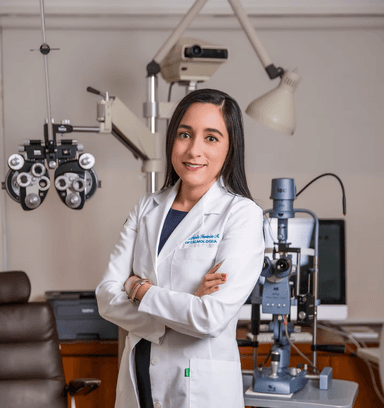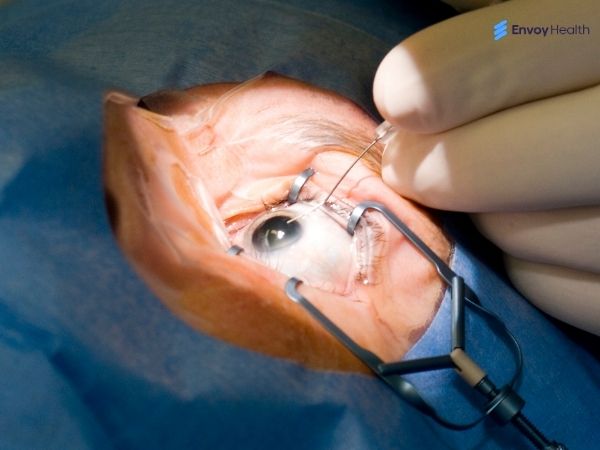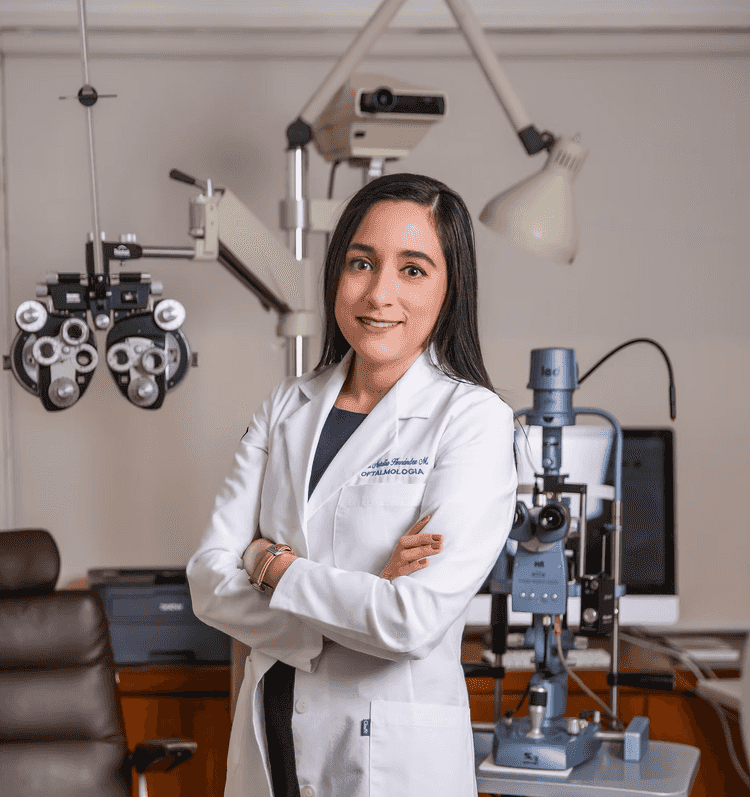From Start to Finish: How Long Does Cataract Eye Surgery Take?

Prathyusha Itikarlapalli
- Content Writer

Dr. Natalia Hernandez Martinez
- Reviewed by

Key Takeaways
- Cataract eye surgery is a simple, short, minimally invasive, outpatient procedure. Patients do not need a hospital stay overnight and can return home a few hours after a cataract operation.
- The actual removal of a cataract and implant placement takes about 15-20 minutes, but the process, including prep and recovery, lasts a few hours.
- Cataract surgery is generally performed on single eye at a time, with the second surgery scheduled approximately 2 to 4 weeks following the first procedure. This wait period allows for healing and effective planning of the correction of refractive errors.
A Brief Overview of Cataract Surgery
Cataracts are dense, opaque protein buildups in the natural lens, causing vision problems. While healthy eyelens normally refract light, offering clear vision, a dense cataract in the eyelens can make the vision hazy. Ophthalmologists surgically remove the cloudy cataract and replace it with an artificial IOL, allowing you to see clearly without hassle. Many candidates experience clear vision immediately, or within a few hours, after cataract surgery. However, you need to train your eyes after cataract surgery for an enhanced experience.
What Are the Three Types of Cataract Surgery?
While we refer to it as the surgical removal of cataracts, note that the procedure varies slightly depending on the method used to break the cataract and the type of surgical incision. Here is a brief overview of various types of cataract surgeries.
Phacoemulsification
Ophthalmologists use ultrasound energy waves to break down the cataracts and extract the pieces using suction force. This is a minimally invasive technique with a very short recovery period.
Extracapsular Cataract Extraction (ECCE)
The ECCE is a traditional method of cataract surgery, where ophthalmologists make a 10-12 mm incision to remove the cloudy cataract. Nowadays, this approach is used to remove advanced cataracts that are resistant to phacoemulsification. Note that, unlike phacoemulsification, this approach requires the use of sutures.
Intracapsular Cataract Extraction (ICCE)
Ophthalmologists remove the cloudy cataract along with the capsule covering it through a single large incision. The ICCE is rarely used due to its longer recovery time and is, of course, a conventional method of cataract surgeries.

Are You Terrified of Cataract Surgery?
While the human eyes are quite sensitive, being terrified about the surgical procedure and the incisions is quite common. However, it's worth noting that cataract surgeries carried out nowadays are minimally invasive and are painless. Ophthalmologists use numbing eyedrops as a local anesthetic before carrying out the procedure. So you don’t feel any pain during the procedure. However, you are still awake and are aware of your surroundings.
And if pain after surgery is your concern, we have covered this for you. Some candidates may start to experience a feeling of grittiness or mild pressure as the anesthesia wears off. These sensations are manageable and are temporary. Using the artificial tears prescribed by your ophthalmologists will help you deal with discomfort. Knowing the pre-procedural steps, you might wonder, “How long does cataract removal surgery take?” Worry not, as we will address this in the upcoming section.
How Long Does One Eye Cataract Surgery Take?
Cataract surgery for one eye typically takes between 10 and 20 minutes. Note that the actual surgical procedure (lens removal and IOL placement) is quite short. However, one needs to spend a few hours in the eye hospital on the day of their cataract surgery. This time period allows them to complete their preparation (numbing of the eye), undergo surgery, and recover from the sedative. Following this, you may return home with the post-op medicines and aftercare instructions.
How Long Does Cataract Surgery Take for Both Eyes?
Cataract surgery for both eyes is typically not preferred. Although it's technically not wrong to have both eyes done at the same time, most ophthalmologists prefer to do one eye at a time. This is to allow your eyes to recover smoothly. While the surgery offers vision clarity within the first few days, your brain needs to adjust to the clear visual processing that follows. So, having surgical removal of cataracts for both eyes can make your recovery period difficult.
So, How Long Between Cataract Surgery on Each Eye?
Typically, ophthalmologists wait 2 to 4 weeks to perform cataract eye surgery on both eyes. While youngsters heal better and recover quickly after cataract removal, the second eye cataract surgery can be performed as early as 2 weeks after the initial surgery. However, the recovery process for elderly patients is generally slow. Waiting for a period of 4 weeks or longer will offer sufficient time to heal. This wait period also allows the eyes to heal and achieve stable vision after cataract surgery. So, the ophthalmologists evaluate the refractive errors and will try to address them by opting for the appropriate eyelens for the second surgery.
How Long Does Cataract Operation Take To Heal?
Cataract surgeries performed nowadays often utilize advanced lasers, allowing for initial healing to occur within 24 to 48 hours. Surgeries performed using the latest technology do not require surgical sutures, allowing incision wounds to heal on their own, a process that occurs quickly. However, it is recommended that you wear an eyeshield and use eyedrops to protect your eye. Besides, wound healing is a functional process, which typically takes around 2-4 weeks for you to return to your daily life activities. Please note that the healing period after a cataract operation varies depending on the patient's age, overall health, and other lifestyle factors. Knowing that the healing is too quick, you might wonder about regaining clear eyesight. Check out the upcoming section.
Can I See Immediately After Cataract Surgery?
You will be able to see clearly within a couple of days after cataract surgery. The removal of dense cataract eyelens and replacing a clear IOL allows light to focus properly on the retina. This often results in noticeably improved vision almost right away. However, your eyesight will continue to sharpen over the following days or weeks as your eye fully heals. Alongside, you need to train your eyes during the recovery period. It's because your cataracts developed gradually, and your brain adapted to process hazy images. However, a clear IOL, which offers sharp vision, requires a different processing approach. Training eyes after cataract eye surgery makes a positive difference in the recovery process. Below, we address some frequently asked questions about the restrictions after cataract surgery.
How Much Bed Rest Is Required After Cataract Surgery?
You do not require bed rest after cataract surgery, because it is a minimally invasive, outpatient procedure. So you will return home on the same day, but after a brief observation period. While you should not strain your eyes or your body. You can watch the screen or read for short periods, while limiting the body activities to less strenuous tasks, such as gentle walking. Note that activities such as bending or lifting heavy weights may increase the blood pressure within your eye, leading to complications.
How Long To Wear Eye Shield at Night After Cataract Surgery?
You should wear the eye shield for around 7-10 days after cataract eye surgery. Some elderly candidates may also be required to wear it for 2 weeks post-cataract removal. The exact time frame depends on the progression of healing. Wearing an eye shield reduces your chances of rubbing your eyes, as they may feel itchy and gritty in the days immediately following cataract surgery.
Can You Swim After Cataract Eye Surgery?
You should avoid swimming for at least 2 to 6 weeks after cataract eye surgery. Additionally, avoid hot water tubs and showers. Swimming increases the risk of infection, and your eyes are also liable to irritants, causing discomfort. Moreover, activities like swimming also increase blood circulation, which can raise the risk of complications.[1]
Can You Bend After Cataract Eye Surgery?
Bending the head or putting it below the waistline is generally restricted after cataract surgery. These activities, such as bowing head to pick up things, can increase the intraocular pressure, delaying the overall healing process. However, you may resume simple daily tasks within a few days and less strenuous bending activities after a few weeks following cataract eye surgery.
What are the disadvantages of cataract surgery?
Cataract surgeries are generally safe and effective. In rare cases, the surgery is associated with complications such as infection, posterior capsular opacification (PCO), and inflammation. The infection and prolonged inflammation are due to improper surgical techniques or inappropriate aftercare. On the other hand, PCO occurs when residual capsular epithelial cells migrate into the thin capsule that surrounds the lens. This results in symptoms similar to those of cataract problems, including hazy vision.[2]
Final word!
Cataract eye surgery takes only minutes but can give you years of clearer vision. Understanding the timeline, from prep to recovery, means you can head into the procedure feeling informed and confident.
Take the next step toward restoring your sight. Sign up with Envoy Health today and let our trusted specialists guide you every step of the way.
References
Disclaimer
The information in this article is for educational purposes only and does not replace medical advice. Always consult your doctor before starting any treatments.
Cataract eye surgery is generally not as painful as it is carried out under local anaesthesia. The ophthalmologist will numb your eyes before performing the cataract eye surgery. You will not feel any pain or discomfort while awake during the procedure. However, you will feel slight discomfort as the anaesthesia wears off.
You do not need to stay in the hospital after cataract surgery as the procedure is carried out on an outpatient basis. You will return home after a few hours following cataract surgery. Please note that you should avoid driving for at least 1-2 days after surgery. Have a friend or family member drive you home.
You should take at least 2-7 days off from work after cataract surgery. Patients can see clearly immediately after cataract surgery. However, straining your eyes too much is not recommended. You can start the simple routine activities in a few days while avoiding heavy, strenuous work.
Laser-assisted cataract surgery is quicker, more accurate, and precise compared to traditional cataract operations. The recovery is quite fast, and you will feel better in a few days after cataract eye surgery.
The actual cataract operation is quite shorter and quick compared to preparation time. While the entire procedure, from start to finish, takes a few hours, the actual cataract removal and implantation of a new IOL only requires 15-20 minutes. The rest of the time is spent on preparation, numbing the eyes, and immediate recovery.
So, we partner with the premier healthcare facilities!
Send me the list
